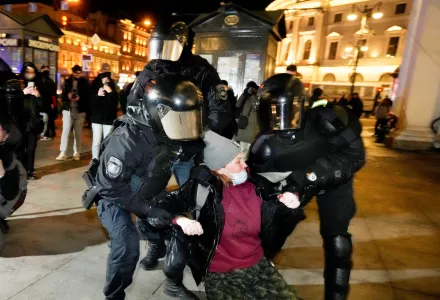
Kennedy School expert counts them off: large-scale rallies, staying power of opposition, shift in views of key individuals
A protest movement against the invasion of Ukraine is growing in Russia. Demonstrations were held in 60 cities on March 6 and in 37 on Sunday, spurred in part by calls to turn out from imprisoned opposition leader Alexei Navalny. More than 14,900 people have been detained by security forces and police for protesting, according to OVD-Info, a Russian human rights organization.
To quell dissent, Russia has intensified a crackdown on independent Russian news outlets, cut off access to social media platforms like Twitter, Facebook, and Instagram, and declared spreading "false information" about the war a criminal offense punishable by up to 15 years in jail. The moves effectively left state-run media outlets as the only sources permitted to report on the attack and the protests without fear of reprisal.
The Gazette spoke with Erica Chenoweth, Frank Stanton Professor of the First Amendment at Harvard Kennedy School and a Susan S. and Kenneth L. Wallach Professor at Radcliffe Institute for Advanced Study at Harvard University. Chenoweth studies mass protest movements, civil resistance, and political violence, and is the author of "Civil Resistance: What Everyone Needs to Know." The interview has been edited for clarity and length.
Q&A
Erica Chenoweth
GAZETTE: Are you surprised by what you've seen so far of the anti-war protests in Russia?
CHENOWETH: I'm not surprised that there is opposition to the war and that some people feel comfortable expressing that opposition publicly. The persistence of the protests will be important to watch. We're only two weeks in, so it's too early to say whether what we're seeing is the beginning of an emerging anti-war coalition that gets some further capacity to expand mobilization and expand its leverage. Right now, as far as I can tell, the protests are largely symbolic expressions of opposition.
What makes mass movements succeed is not just public expressions, but ways to directly either interfere with the implementation of a policy or to shift the balance of power. It's impossible to know what's happening behind the scenes, but most Russia watchers are pretty skeptical that there's any serious movement in that regard.
If there is some major shift, we won't know it until it happens, because Russia is an autocratic country, and there have been pretty extreme crackdowns on both independent media and the ability of people to engage in public discourse that is critical of the war, above and beyond arrests. And so, what happens is that when people are opposed, particularly elites who might disrupt the status quo, they don't say so until it's clear that everybody's going to say so at the same time. What's really needed is some kind of elite shift, and those don't always happen when there are protests. Protests are necessary but insufficient predictors of when elites decide to shift their loyalty....
Pazzanese, Christina. "What Would Be Signs Protests in Russia are Making a Difference?" Harvard Gazette, March 13, 2022.
The full text of this publication is available via Harvard Gazette.



